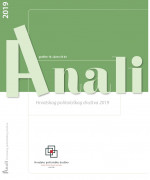Socijalni rad i logika sigurnosti u eri sekuritizacije terorizma
Social Work and Security Logic in the Era of Terrorism Securitization
Author(s): Mirko Bilandžić, Josip PandžićSubject(s): Security and defense, Studies in violence and power, Peace and Conflict Studies
Published by: Hrvatsko politološko društvo
Keywords: social work; social services; securitization; counterterrorism; national security;
Summary/Abstract: Social work is oriented towards improving the quality of life and developing the potentials of individuals, especially of vulnerable social groups, as well as adressing societal problems, risks, injustices and inequalities. Human rights and social justice constitute the fundamental principles of social work. In the terrorism securitization era, i.e. from the beginning of 21st century, due to the growing multidimensionality of terrorism by which various policies, processes and actors overlap and network, boundaries between social and security policies have been gradually dissappearing. Departure from the professional care for vulnerable populations function towards the "surveillance" function, by which individuals are controled in the interest of preserving social order and security, puts social work in all its meanings in a different role. In counterterrorist action, social services and social work are becoming subordinated to the security logic. By analyzing the framework for introducing social work into counterterrorist status and the role of social services in counterterrorism it becomes clear that social work performs the function of a national security policy intelligence instrument in the counterterrorist strategies of Western democracies.
Journal: Anali hrvatskog politološkog društva
- Issue Year: 2019
- Issue No: 16
- Page Range: 181-198
- Page Count: 18
- Language: Croatian

